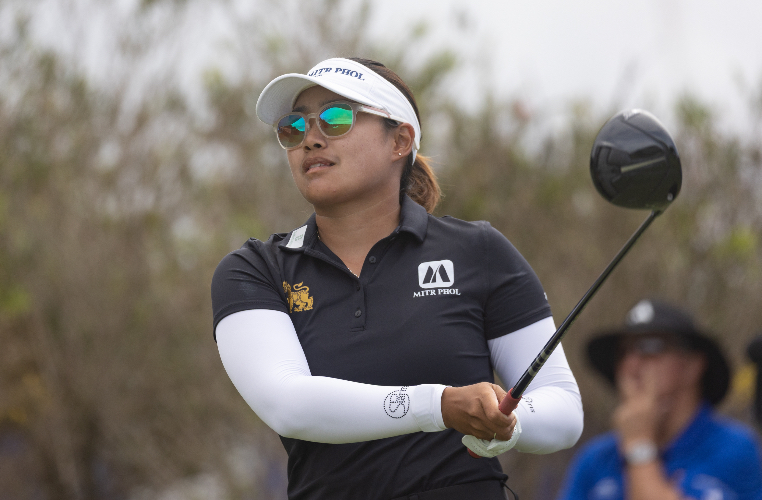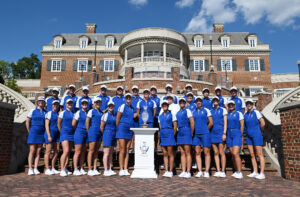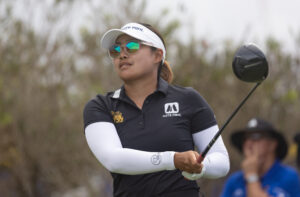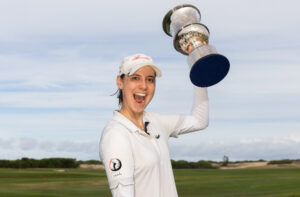Deaf LET Winner Diksha Dagar Defies Expectations
There’s a chance you have never heard her name, which is fine. For years, Indian professional and Ladies European Tour winner Diksha Dagar didn’t hear it either. That’s because the 21-year-old, who was one of a dozen players to qualify for the AIG Women’s Open this past Monday at nearby North Berwick, was born deaf.
Today, Dagar holds the distinction of being the only golfer in history to compete in the Olympic Games and the Deaflympic Games. She qualified for the former in Tokyo after South African Paula Reto came down with COVID and had to withdraw. The latter she has played in twice, once in Turkey in 2017 where she was a silver medalist, and in Caxias do Sul, Brazil in 2021 where Dagar won the gold medal.
Every step she takes these days is historic. She was the youngest Indian and the first deaf player ever to win an LET event when she captured the 2019 Investec South African Women’s Open. And on Thursday, she will become the first deaf woman to compete in a major championship at Muirfield.
“I was playing in the practice round and it was a complete headwind and I thought ‘oh my god, this is going to be tough’ and I was thinking about how to deal with it,” Dakar said of her qualifying attempt, even though her statement could have been a metaphor for her life. “On the actual day it was an opposite wind, on the first hole it was headwind before, and it changed to a tailwind. I knew every shot was going to be important and I tried to save my shots as much as I could.
Dakar also played at North Berwick when she was 15 years old in the British Girls Amateur Championship.
“When I played at North Berwick, there were some sweet memories,” she said. “With over 100 people playing for 12 spots, I tried not to think about the field or how many spots. I told myself to go for it and play as if you’re alone. So that’s why I played well.”
Tuning out the distractions is nothing new for someone like Dagar. Those with hearing impairment live that life every day, through no volition of their own. According to statistics from the World Health Organization, more than 360 million people in the world are functionally deaf, most from poor countries with little or no access to auditory specialists. Those people struggle in ways few can imagine.
Deafness is hard to describe because it’s impossible to simulate. You can’t remove your auditory receptors for an hour or two to experience what it’s like. Hearing is unique among the senses in that respect. If you want to know what it’s like to be without sight, you can put on a blindfold in the dark. You can also get a shot of Novocain and marvel at the weirdness that comes with losing your sense of touch. If you caught COVID-19 in the last two years, you might have experienced what it’s like to lose your taste and smell. But deafness is different.
You can simulate hearing loss easily enough. Put in ear plugs and don noise-canceling headsets and you will muffle most sounds. But if lightning strikes a tree nearby, you are going to hear something. Even in your quietest moments, there are sounds. No matter how quiet you make things, hearing people hear. That makes it harder to appreciate the challenges of those who can’t.
Even a Cochlear implant, which Dagar has had since childhood, does not “cure” deafness. The implant bypasses the inner ear and sends stimuli directly to the brain. With practice, things like one-on-one conversations become possible. But at a table of eight, without the benefit of lip-reading, even the most advanced hearing devices fail to segregate a cacophony of sounds. That is why deaf persons, even ones with auditory devices, can sometimes become withdrawn and insular.
Dagar has never been that way though, in large part because of her father, Narinder, a colonel in the Indian army and a one-time scratch golfer. Col. Dagar’s military service gave the family access to golf facilities (something the average Indian does not have), and his leadership never allowed his daughter to think she was anything but capable. There was no “woe is me” in the Dagar household. From the get-go, Col. Dagar believed that his daughter had the makings of a champion.
“I’m convinced that Diksha has a lot of raw talent as she is effectively self-taught,” the colonel said when she was an amateur. “She’s also a leftie, so she’s craftier. She is fearless in her shot making and has great ball striking.”
Diksha began learning golf at the age of six and grew to love the game thanks in part to her father.
“I love to play the sport, but (growing up) no one was ready to provide coaching. So, my dad became my coach,” she said. “Despite his job, he coached me and my brother, who also has hearing problems like me. I could not have played alone, so he coached my brother (Yogesh), too. I hardly had any friends. Besides my family, golf is my life.”
That life in the game has now taken her to the highest level. With the implant on, Dagar will hear the mechanized interpretation of her name when it’s announced on the first tee at Muirfield, along with the applause from an appreciative gallery.
What she won’t hear are the millions of auditory-impaired kids she can inspire; those who will no doubt be saying, out loud or through sign, “Come on, Diksha.”




















